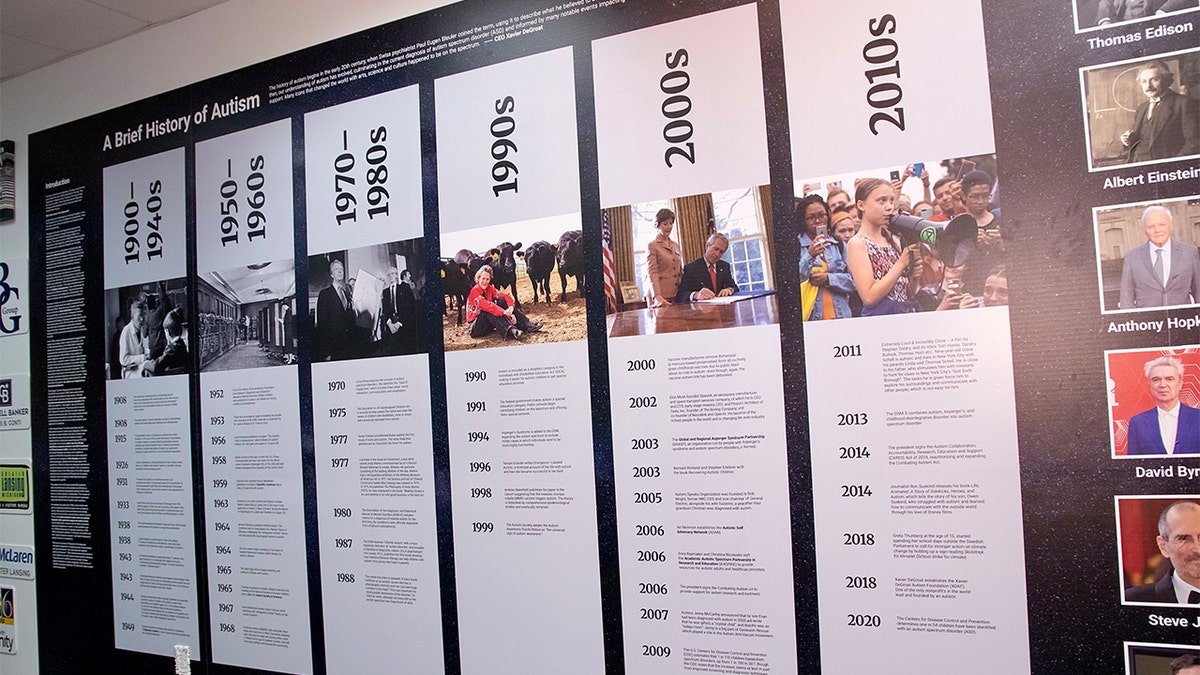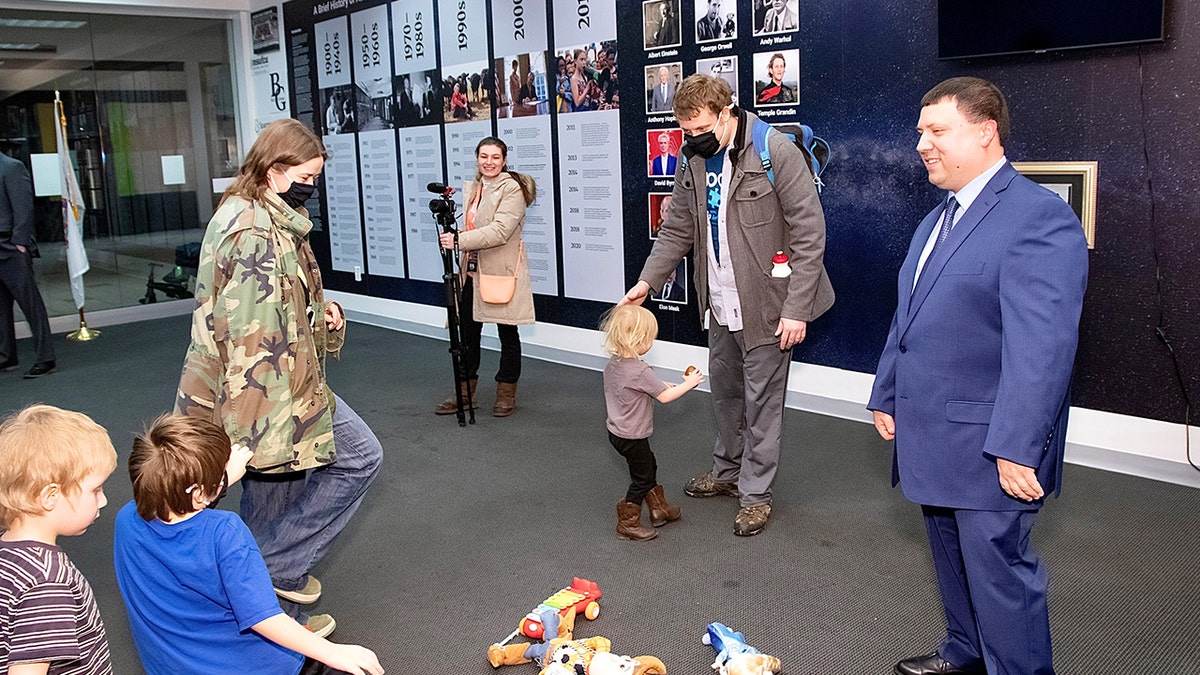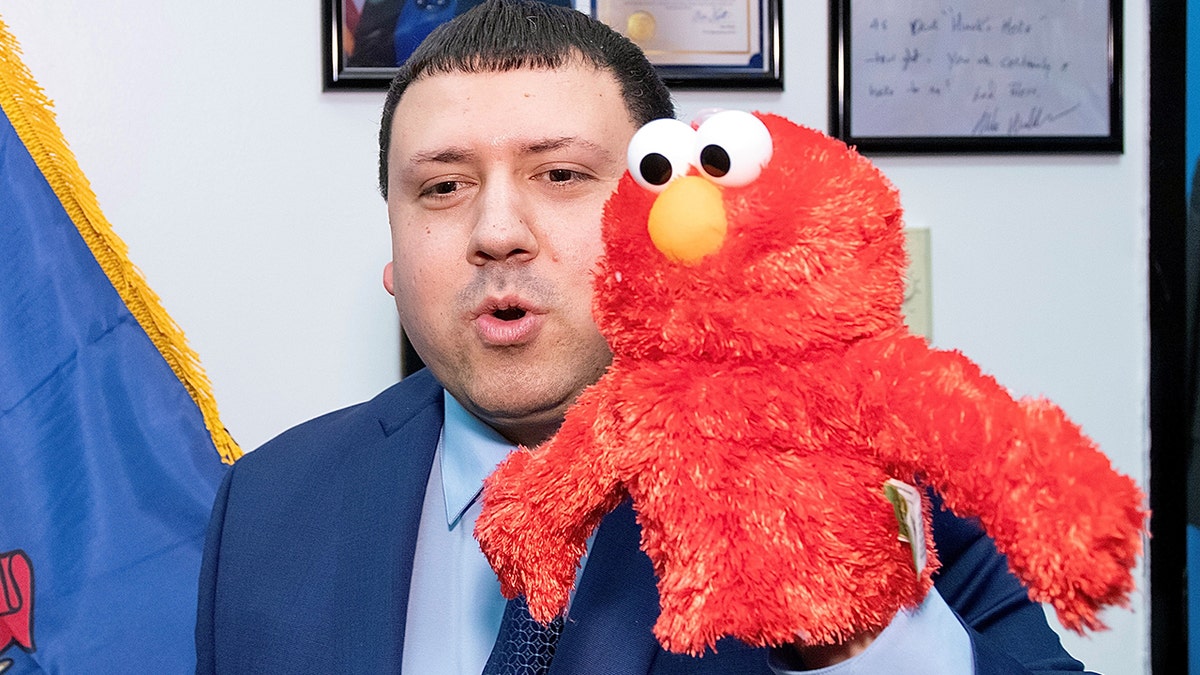Fox News Flash top headlines for February 12
Fox News Flash top headlines are here. Check out what's clicking on Foxnews.com.
Xavier DeGroat, who made history as a White House intern with autism, is making his mark once again by opening up a museum in Michigan dedicated to the history of autism.
DeGroat, a 31-year-old Lansing resident who interned for President Trump, celebrated the grand opening of his Autism History Museum on Feb. 4. He hopes the museum will raise public awareness and serve as a welcoming community space for both kids and adults.
"There's never been an autism history museum like this," DeGroat told Fox News Digital.
WHITE HOUSE INTERN WITH AUTISM CHANGES LAWS AND OPENS HEARTS
The museum is situated inside Meridian Mall, which isn't too far from bustling Michigan State University and the Michigan Capitol. He had an assist in opening the museum from legendary former MSU football coach Mark Dantonio, who along with his wife, Becky, donated money to kickstart the project.

Inside the autism history museum founded by the Xavier DeGroat foundation. (Gary Shrewsbury Photography)
Dantonio said DeGroat has a "great heart" and is "trying to do good" for many people.
"I got to know X when I was a football coach at Michigan State and he would come to practice quite often," Dantonio told Fox News Digital Saturday, calling DeGroat by his nickname. "I got to know him over the course of time and learn about his mission and what he was trying to do. I thought it was a worthy cause that would affect a lot of people and would be something that I could get behind a little bit and do something positive for."

Xavier DeGroat with the Michigan State University football team in 2017 along with Coach Mark Dantonio. Photo courtesy of Matthew Mitchell. (Matthew Mitchell)
DeGroat made national headlines in 2020 when he landed an internship at the White House under Trump. He is believed to be among the first people who disclosed an autism diagnosis to intern at the White House.
His new museum is within a mall storefront space that houses the offices for his foundation as well as a timeline of the sometimes painful history of autism, starting in the 1900s.
Autism used to be labeled a part of schizophrenia and then mental retardation, and some were even considered "devils by society," DeGroat said. Nonetheless, people on the spectrum and those who had signs of autism, but were never fully diagnosed have had a "profound" impact on society, including Thomas Edison, Albert Einstein, Greta Thunberg and Elon Musk, he said.
AUTISM AFFECTS 1 IN 44 US CHILDREN, CDC DATA SUGGESTS
"There was a lot of negative history but a lot of positive history about autism too and that's what I'm showing," DeGroat said.

Xavier DeGroat, center, at the ribbon cutting ceremony for his Autism History Museum at the Meridian Mall in Okemos, Mich, on Feb. 4, 2022. (Gary Shrewsbury Photography)
DeGroat is happy the museum is in the mall, which is a gathering space for students and families. And the Meridian Mall has embraced the new partnership, too.
"It's just a real big win-win for us and for him," Dan Irvin, senior general manager of CBL Properties, which owns and manages Meridian Mall, told Fox News Digital. "Having the first museum on the history of autism at Meridian Mall is spectacular. And I will tell you, I don't know another individual that is as driven to get that message out as Xavier. He is fantastic."
DeGroat started the Lansing-based Xavier DeGroat Autism Foundation in 2018 to help others with autism overcome obstacles and he's already used that platform to change public policy on a national and local level.

Xavier DeGroat at his autism museum opening on Feb. 4, 2022 at Meridian Mall in Okemos, Mich. (Gary Shrewsbury Photography)
Michigan Gov. Gretchen Whitmer signed into law in 2020 bipartisan legislation that DeGroat had sought to allow state driver’s licenses and license plates to indicate to law enforcement that an individual has autism or a communication impediment.
The new designation -- embedded within data stored on the ID card -- should alert police that when they pull over someone with autism the sensory overload of the lights and sirens may have tipped off a meltdown situation that could be misunderstood by an approaching officer. People with autism can also have trouble communicating and can be very sensitive to physical touch, which may cause them to react in a way an officer could perceive as threatening.
MICHIGAN TEEN WITH AUTISM GETS BRUTALLY BEATEN BY HIGH SCHOOL CLASSMATES, CAPTURED ON VIDEO
DeGroat also successfully worked with Reps. Dan Kildee, D-Mich., and Michael Burgess, R-Texas, on a bipartisan letter to the Transportation Security Administration (TSA) to recognize the state ID cards that indicate someone has a communication impediment. The added information will alert TSA agents on how to accommodate people with autism who may have sudden reactions to the sounds, stress and touch associated with airline security.

Xavier DeGroat says he wants the museum space to be a welcoming community space, inspired by "Mister Rogers' Neighborhood." He plans story times, tours with kids, and sensory experiences. (Gary Shrewsbury Photography)
"Since I met Xavier in 2016 when he interned in my congressional office, I’ve come to expect that he can achieve anything he puts his mind to," Kildee told Fox News Digital. "I commend him for this latest achievement."
Diagnosed with autism at age 4 and misunderstood for much of his childhood, DeGroat had a rough time in school. He was bullied and called names like "retard." His peers would egg him on to do things, like shooting rubber bands in class, that landed him in trouble. In high school, as he struggled to cope and had lots of anxiety, he found some respite at the library, where he started reading up on influential leaders.
CLICK HERE TO GET THE FOX NEWS APP
At 18, his dad started taking him regularly to the Henry Ford Museum in Dearborn, Mich, where DeGroat would dream of working there and one day become a curator.
Now that he has a museum of his own, DeGroat hopes people can appreciate others' unique individual traits and not count them out because of a perceived disability.
"I want people to know that autism is just a label," he said. "And that does not define that person."






